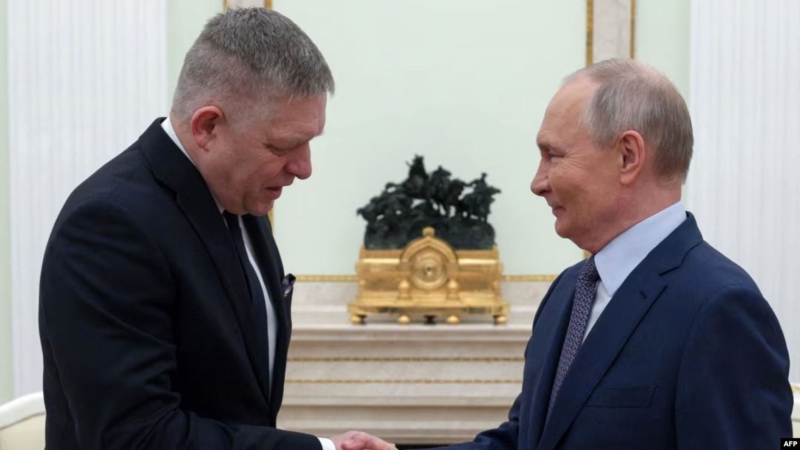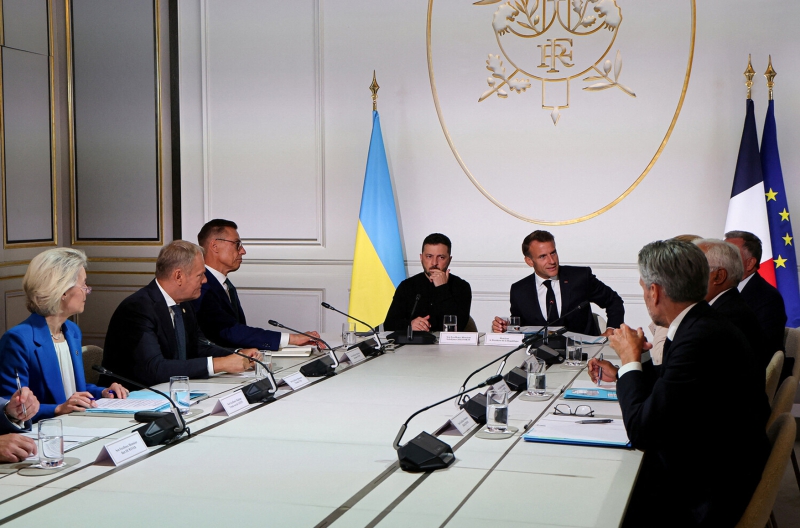Meeting of the “Coalition of the Willing” in Paris, Sept. 4, 2025. Photo: Ludovic Marin / Reuters
The meeting of Ukraine’s allies last week in Paris has been portrayed as the West’s response to the Shanghai Cooperation Organization summit in Beijing. Much like the Asian gathering, where symbolic handshakes outnumbered concrete decisions by a wide margin, the Paris meeting was largely demonstrative: while some specific promises were made to Ukraine, genuine security guarantees still appear to be a long way off.
Coalition in search of resolve
Last week’s meeting of Ukrainian allies in Paris was meant to reinvigorate the spirit of the now-defunct Ramstein format. But the result was noticeably more modest, with only six European leaders attending in person (two of which, the UK’s Keir Starmer and Ukraine’s Volodymyr Zelensky, come from non-EU members). Germany and Italy were absent, and the United States was represented by “general-purpose” presidential envoy Steve Whitkoff. Meanwhile, two NATO members (Hungary and Slovakia) and three EU members (the latter plus Malta) declined to participate altogether.
While the U.S. effectively hosted and set the agenda for Ramstein meetings, here that role naturally fell to Emmanuel Macron. On the eve of the Paris summit, he stated that security guarantees for Ukraine had been prepared: “We have decided to initiate legal and political steps to implement these security guarantees.” As Macron added at the joint press conference with Volodymyr Zelensky following the meeting, 26 countries have now formally agreed to either send a contingent of forces to Ukraine or to provide some means to support the coalition forces for security at sea or in the air.
As encouraging as such statements may sound, preliminary caveats expressed by several leaders suggest that those willing to “provide certain resources” far outnumber those who are ready to actually send their country’s troops. In fact, the question of who is willing to deploy forces — and in what numbers — remains unresolved, meaning it is far from clear that their strength will be sufficient to provide the promised “guarantee” of Ukrainian security. Still, one thing is certain: the allies, despite dubbing themselves the “coalition of the determined,” are still lacking resolve.
Another question is whether security guarantees need to be coordinated with Russia, which flatly refuses to accept the deployment of NATO troops in Kyiv-controlled territories. “Why are we interested in what Russia thinks about troops in Ukraine? …If Ukraine wants to have security guarantee forces in Ukraine to support a peace deal, it's up to them,” said NATO Secretary-General Mark Rutte, who did not participate in the Paris meeting. Unfortunately, the allies are only willing to deploy their contingents to Ukraine after a peace agreement is signed — but given the current situation on the front, Moscow almost certainly will not agree to the proposed terms.
“Why are we interested in what Russia thinks about troops in Ukraine?” NATO Secretary-General Mark Rutte asked in Paris
Among the specific pledges of military assistance are Germany’s commitments to equip five new Ukrainian brigades, strengthen Kyiv’s air defenses, and cooperate on Ukrainian missile production. Similarly, the UK has promised (on behalf of the entire coalition) to supply Kyiv with long-range missiles.
A show of confidence from Putin
It is hard to say whether the meeting in Paris made any impression on the Kremlin. However, on the eve of the gathering, Vladimir Putin was projecting confidence by repeating old narratives in his trademark mocking and boorish manner.
Speaking with Slovak Prime Minister Robert Fico in China, the Russian dictator suggested launching an energy blockade of Ukraine: “Cut off their gas supplies that come through reverse flows. Cut off their electricity supplies.” The next day, he declared his readiness to meet with Zelensky, but only if the latter agreed to come to Moscow.
At the same time, Russia’s five-term head of state referred to the president of Ukraine as “the acting head of the administration, let’s put it delicately,” once again hinting at the supposed illegitimacy of his counterpart in Kyiv. Absent any acceptable diplomatic solution, Putin also threatened to continue the war until complete victory: “Otherwise, we will have to meet our objectives by military means.”

While continuing to speak respectfully about Trump, Putin simultaneously takes actions that nullify all of the American president’s peace efforts. The Russian leader has staked virtually everything on winning the war against Ukraine, which is apparently why he is rejecting the possibility of exiting the war on terms that ought to be favorable for the overall geopolitical standing of the Russian Federation. Trump is offering real concessions, and Putin is nevertheless refusing to accept them.
While continuing to speak respectfully about Trump, Putin nullifies all of his peace efforts
At the same time, the situation at the front is nowhere near as favorable for the Russian army as Kremlin propaganda claims. As a result of the so-called “summer offensive,” the Russians did indeed push back the Ukrainian defensive line somewhat, but Moscow’s forces failed to achieve a breakthrough of the front. They made no significant territorial gains and did not gain control over a single town of even symbolic military importance. Similarly, there are no grounds to believe that a “fall offensive” will be any more successful.
While Putin’s bravado is largely a bluff, the Kremlin still holds a few valuable cards. European elites lack determination and are terrified of losing voter support. The White House has become a hostage to the alternative worldview constructed in Trump’s mind. And the Ukrainian military remains incapable of driving the Russian army out of the occupied territories. Despite Trump’s visible irritation with Putin, the U.S. president seems reluctant to admit, even to himself, that he has already lost the diplomatic game to his opponent (whom he would rather see as a partner) and that he must start a new one from a stronger position. Meanwhile, the Europeans cannot break the habit of looking to Washington for support.
Trump strikes at his European backers
The group call between the participants of the Paris summit and Trump was likely another attempt to gauge the extent to which the allies can count on America’s backing. However, the heads of state once again received no clear answer. Moreover, Trump issued new demands to Europe: to stop buying gas from Russia and, more generally, to coordinate anti-Russian sanctions policy with the U.S. (which was in fact the norm under the Biden administration).
Trump issued a new demand to Europe: to stop buying gas from Russia
The Europeans did not object. On the contrary, Finnish President Alexander Stubb, who is playing an increasingly large role in coordinating the containment of Russia, stated that talks on this matter would begin within 24 hours of Trump’s proposal. Paradoxically, the American leader’s new idea delivers a significant blow to the positions of the “European dissidents” — Viktor Orbán and Robert Fico, who proclaim themselves Europe’s most devoted Trumpists. Just yesterday, they were trying to block the EU’s complete phase-out of Russian hydrocarbons (targeted for the end of 2027) and were blaming Ukraine for the systematic strikes on the Druzhba pipeline. Yet today, Budapest and Bratislava are facing potential isolation within the collective West — at least, they are until Trump’s next mood swing shifts the situation yet again.

